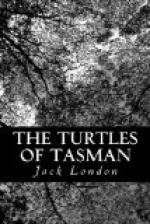Frederick was constantly oppressed by the feeling of being out of it all. He was a social being, and he liked fun, even if it were of a more wholesome and dignified brand than that to which his brother was addicted. He could not understand why in the past the young people had voted his house a bore and come no more, save on state and formal occasions, until now, when they flocked to it and to his brother, but not to him. Nor could he like the way the young women petted his brother, and called him Tom, while it was intolerable to see them twist and pull his buccaneer moustache in mock punishment when his sometimes too-jolly banter sank home to them.
Such conduct was a profanation to the memory of Isaac and Eliza Travers. There was too much an air of revelry in the house. The long table was never shortened, while there was extra help in the kitchen. Breakfast extended from four until eleven, and the midnight suppers, entailing raids on the pantry and complaints from the servants, were a vexation to Frederick. The house had become a restaurant, a hotel, he sneered bitterly to himself; and there were times when he was sorely tempted to put his foot down and reassert the old ways. But somehow the ancient sorcery of his masterful brother was too strong upon him; and at times he gazed upon him with a sense almost of awe, groping to fathom the alchemy of charm, baffled by the strange lights and fires in his brother’s eyes, and by the wisdom of far places and of wild nights and days written in his face. What was it? What lordly vision had the other glimpsed?—he, the irresponsible and careless one? Frederick remembered a line of an old song—“Along the shining ways he came.” Why did his brother remind him of that line? Had he, who in boyhood had known no law, who in manhood had exalted himself above law, in truth found the shining ways?
There was an unfairness about it that perplexed Frederick, until he found solace in dwelling upon the failure Tom had made of life. Then it was, in quiet intervals, that he got some comfort and stiffened his own pride by showing Tom over the estate.
“You have done well, Fred,” Tom would say. “You have done very well.”
He said it often, and often he drowsed in the big smooth-running machine.
“Everything orderly and sanitary and spick and span—not a blade of grass out of place,” was Polly’s comment. “How do you ever manage it? I should not like to be a blade of grass on your land,” she concluded, with a little shivery shudder.
“You have worked hard,” Tom said.
“Yes, I have worked hard,” Frederick affirmed. “It was worth it.”
He was going to say more, but the strange flash in the girl’s eyes brought him to an uncomfortable pause. He felt that she measured him, challenged him. For the first time his honourable career of building a county commonwealth had been questioned—and by a chit of a girl, the daughter of a wastrel, herself but a flighty, fly-away, foreign creature.




